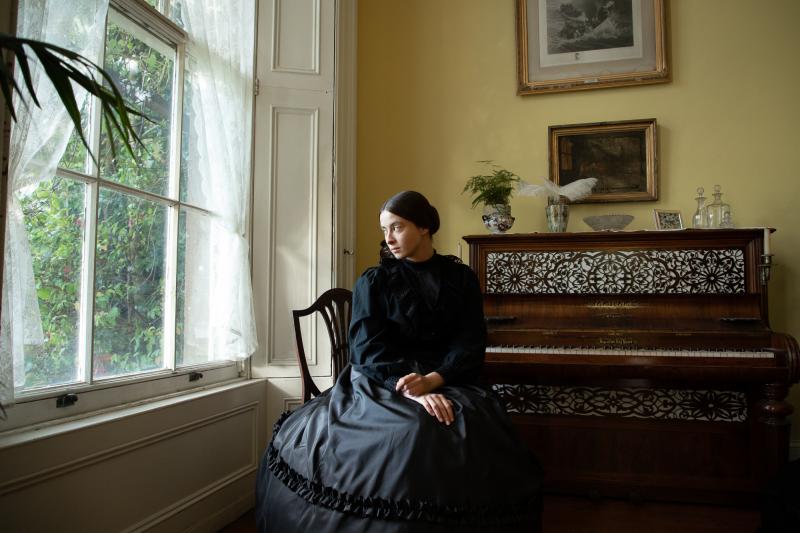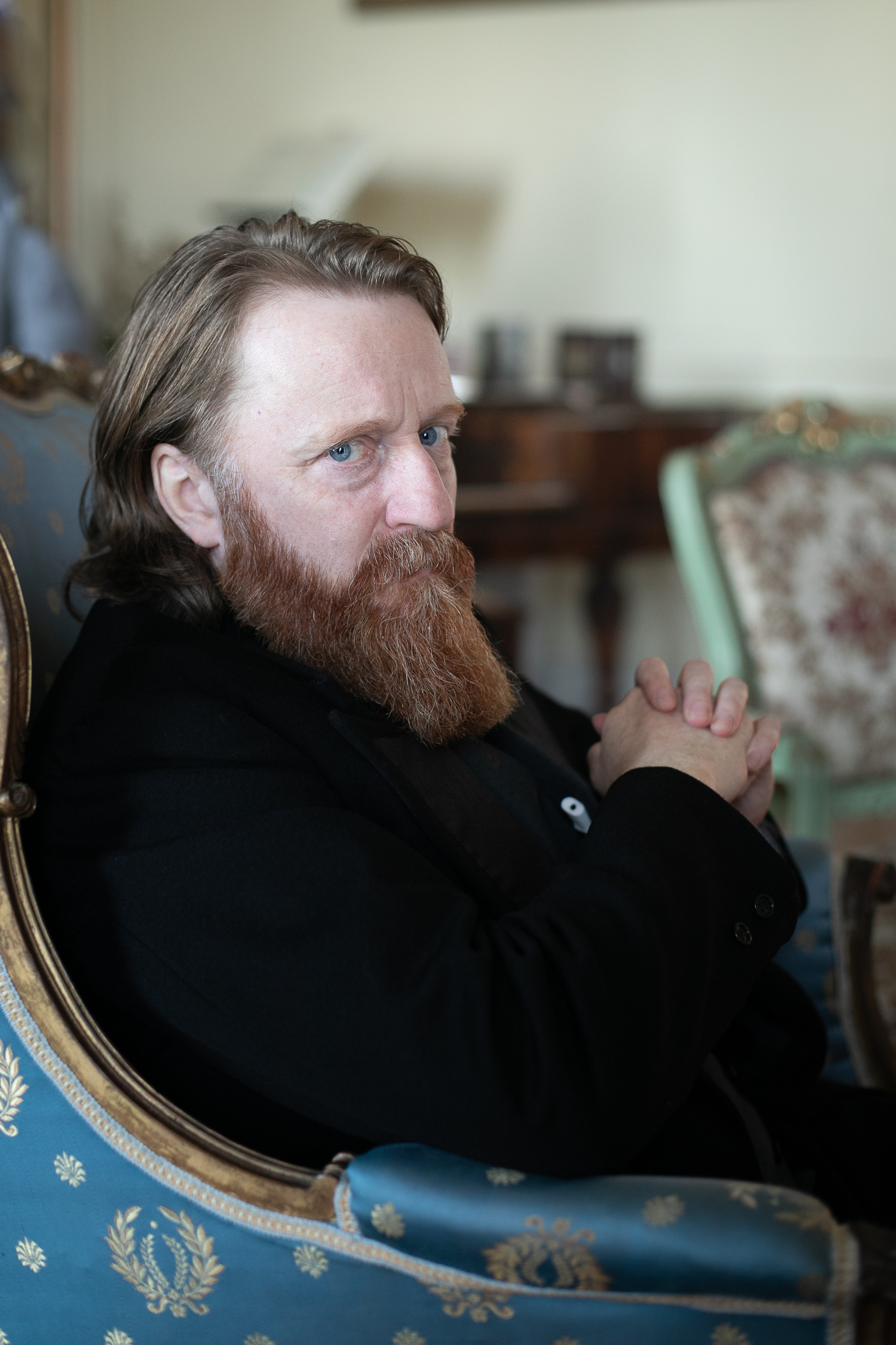Lies We Tell review - fear and gaslighting in 1860s Ireland | reviews, news & interviews
Lies We Tell review - fear and gaslighting in 1860s Ireland
Lies We Tell review - fear and gaslighting in 1860s Ireland
An uncle plays cat and mouse with his heiress niece in a taut melodrama

It is 1864 and the lush green lawns of Knowl, the stately home in Ireland that Maud Ruthyn (Agnes O’Casey) will inherit when she reaches the age of 21, are beautifully kept. Everything is in its place. Maud expects deference, especially from the domestic staff.
Maud is a steely character, so when the trustees of her late father’s estate advise her to go against the terms of his will and appoint them as trustees to her fortune, she instantly suspects them of being on the make. They are merely trying to warn her that her wily Uncle Silas (David Wilmot, pictured below), a suspected murderer, is “hardly a fit person” to be her guardian. Maud's mind is set, however. She is as dismissive of their advice as she is disdainful towards them. Naturally, as it quickly turns out, they prove to be right.
When Silas does move in to Knowl, Maud mollifies him, telling him he has been maligned. They are are amiable, even jokey with each other. But it isn't long before Silas's mask slips, his complicit smiles disappearing as trust evaporates and a battle of wills between orphaned teenager and scheming uncle ensues with frightening intensity.
 Silas brings with him a motley crew of acolytes and co-conspirators: his odious son Edward (Chris Walley), his wacko daughter Emily (Holly Sturton), and a deeply sinister governess, Madame (Grainne Keenan). Together they work on undermining Maud’s sanity and her rights to inherit. She may be determined, but they make her doubt everything.
Silas brings with him a motley crew of acolytes and co-conspirators: his odious son Edward (Chris Walley), his wacko daughter Emily (Holly Sturton), and a deeply sinister governess, Madame (Grainne Keenan). Together they work on undermining Maud’s sanity and her rights to inherit. She may be determined, but they make her doubt everything.
Lisa Mulcahy’s Lies We Tell, scripted by Elisabeth Gooch, is the latest of many film and TV adaptations of Irish writer Sheridan Le Fanu’s 1864 novel Uncle Silas, A Tale of Bartram Haugh. Back in 1989, the BBC series The Dark Angel, starring Peter O’Toole and Beatie Ednie, was hailed as the "definitive" version. No chance: Le Fanu's novel is a gift that keeps on giving, fertile ground for further re-imagining.
Mulcahy and Gooch’s version is a very free adaptation of just some of the sections of the book. Concentration and distillation have given a real tautness to the plotting. There is also an updating – feminist tropes run through the script. The focus of Lies We Tell is completely on Maud, who scarcely leaves the screen. The action stays at Knowl, claustrophobically photographed (mostly at Ardgillan Castle in Co. Dublin) by Eleanor Bowman.
Mulcahy has placed enormous trust in O’Casey, whom she previously directed in Ridley Road and who also appears in this week's The Miracle Club. The Finsbury Park-born great-grandaughter of the Irish playwight Seán O'Casey carries the weight of Lies We Tell's drama remarkably well.
The film's strength is its patient, cunning building of irresistible crackling tension as cruelty and fear become the dominant forces. This is achieved with such wonderful pacing that the denouement, when it comes, inevitably seems a bit rushed. That said, Lies We Tell is a hughly recommendable gaslighting melodrama.
rating
Explore topics
Share this article
more Film
 I.S.S. review - sci-fi with a sting in the tail
The imperilled space station isn't the worst place to be
I.S.S. review - sci-fi with a sting in the tail
The imperilled space station isn't the worst place to be
 That They May Face The Rising Sun review - lyrical adaptation of John McGahern's novel
Pat Collins extracts the magic of country life in the west of Ireland in his third feature film
That They May Face The Rising Sun review - lyrical adaptation of John McGahern's novel
Pat Collins extracts the magic of country life in the west of Ireland in his third feature film
 Stephen review - a breathtakingly good first feature by a multi-media artist
Melanie Manchot's debut is strikingly intelligent and compelling
Stephen review - a breathtakingly good first feature by a multi-media artist
Melanie Manchot's debut is strikingly intelligent and compelling
 DVD/Blu-Ray: Priscilla
The disc extras smartly contextualise Sofia Coppola's eighth feature
DVD/Blu-Ray: Priscilla
The disc extras smartly contextualise Sofia Coppola's eighth feature
 Fantastic Machine review - photography's story from one camera to 45 billion
Love it or hate it, the photographic image has ensnared us all
Fantastic Machine review - photography's story from one camera to 45 billion
Love it or hate it, the photographic image has ensnared us all
 All You Need Is Death review - a future folk horror classic
Irish folkies seek a cursed ancient song in Paul Duane's impressive fiction debut
All You Need Is Death review - a future folk horror classic
Irish folkies seek a cursed ancient song in Paul Duane's impressive fiction debut
 If Only I Could Hibernate review - kids in grinding poverty in Ulaanbaatar
Mongolian director Zoljargal Purevdash's compelling debut
If Only I Could Hibernate review - kids in grinding poverty in Ulaanbaatar
Mongolian director Zoljargal Purevdash's compelling debut
 The Book of Clarence review - larky jaunt through biblical epic territory
LaKeith Stanfield is impressively watchable as the Messiah's near-neighbour
The Book of Clarence review - larky jaunt through biblical epic territory
LaKeith Stanfield is impressively watchable as the Messiah's near-neighbour
 Back to Black review - rock biopic with a loving but soft touch
Marisa Abela evokes the genius of Amy Winehouse, with a few warts minimised
Back to Black review - rock biopic with a loving but soft touch
Marisa Abela evokes the genius of Amy Winehouse, with a few warts minimised
 Civil War review - God help America
A horrifying State of the Union address from Alex Garland
Civil War review - God help America
A horrifying State of the Union address from Alex Garland
 The Teachers' Lounge - teacher-pupil relationships under the microscope
Thoughtful, painful meditation on status, crime, and power
The Teachers' Lounge - teacher-pupil relationships under the microscope
Thoughtful, painful meditation on status, crime, and power
 Blu-ray: Happy End (Šťastný konec)
Technically brilliant black comedy hasn't aged well
Blu-ray: Happy End (Šťastný konec)
Technically brilliant black comedy hasn't aged well

Add comment